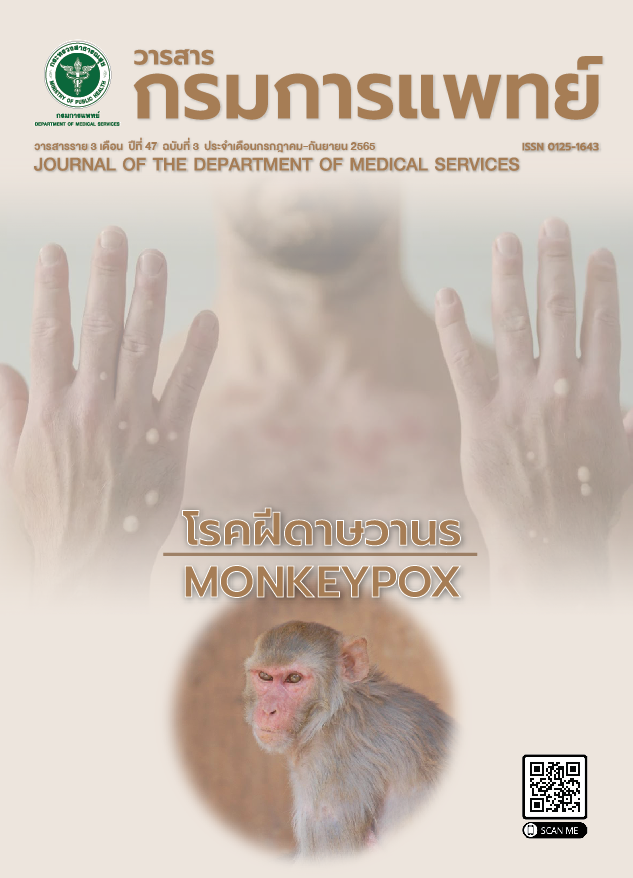The Development of Medication Reconciliation System in Pediatric Patients by using Computerized Program at Queen Sirikit National Institute of Child Health
Keywords:
Medication reconciliation, Medication errors, Pediatric patientsAbstract
Background: Medication reconciliation (MR) has been identified as an important process to prevent medication errors at transitions of care. The pharmacist completed all process of MR, but did not cover all wards and all care transitions due to time limitation. Objective: To develop MR system by using computerized program on admission and discharge, and to evaluate MR system in pediatric patients at Queen Sirikit National Institute of Child Health. Method: This descriptive study was designed to determine the development of MR computerized program. Medication data of patients was collected between October 1st 2017 to September 30th 2018. The coverage of MR program and medication errors were analyzed by descriptive statistics. Result: It was found that 15,357 patients admitted, 96.58% had been approached through MR computerized program and 95.22% were taken within 24 hours. Most of them (77.71%) had no medication use before admission. About 15,317 discharge patients, 75.61% had been approached through MR computerized program. Those were 50.71% of the patients used medicine 1 – 5 times during discharge. Medication errors were found in 145 patients (171 medications) on discharge more than admission. The highest proportions of medication errors were due to wrong dose (67.59%), followed by omission error (26.90%). After the errors were found, pharmacist consulted physicians to correct prescriptions for all patients (100%). Therefore, all of medication errors were in category B (100%). The most errors were found in the medication that used in respiratory tract (25.15%), gastrointestinal tract (21.05%), and nervous system (14.62%). Conclusion: The development of MR system in pediatric patients using effective computerized program and the coverage of process on admission and discharge within an appropriate time can prevent potential medication errors. Due to computerized program, MR process was completed on time and covered all wards. Therefore, MR is an essential process to confirm the safety of medication use in patients.
References
Resar R. Medication Reconciliation Review: Institute for Healthcare Improvement. New York: McGraw-Hill; 2008.
. Thida Ningsanon. Medication reconciliation. In: Thida Ningsanon, Preecha Montakarnkul, Suwattana Julawattanaton, eds. Medication Reconciliation. Bangkok: Prachachon; 2009. p.1-26.
The Joint Commission on Accreditation of Healthcare Organizations. Using medication reconciliation to prevent errors. Sentinel Event Alert Issue 35, Jan 2006.
Mueller SK, Sponsler KC, Kripalani S, Schnipper J. Hospital-based Medication Reconciliation Practices: A Systematic Review. Arch Intern Med 2012;172:1057-69.
Mekonnen AB, McLachlanet AJ, Brien JE. Pharmacy-led Medication Reconciliation Programmes at Hospital Transitions: a Systematic Review and Meta-analysis. J Clin Pharm Ther 2016a;41:128-44.
Mekonnen AB, McLachlanet AJ, Brien JE. Effectiveness of Pharmacist-led Medication Reconciliation Programmes on Clinical Outcomes at Hospital Transitions: a Systematic Review and Meta-analysis. BMJ Open 2016b;6:e010003.
Mekonnen AB, McLachlanet AJ, Brien JE. Impact of Electronic Medication Reconciliation Interventions on Medication Discrepancies at Hospital Transitions: a Systematic Review and Meta-analysis. BMC Med Inform Decis Mak 2016c;16:112.
World Health Organization. Medication Errors: Technical Series on Safer Primary Care. Geneva: World Health Organization; 2016. Licence: CC BY-NC-SA 3.0 IGO.
National Coordinating Council for Medication Error Reporting and Prevention. What is a medication error? New York, NY: National Coordinating Council for Medication Error Reporting and Prevention; 2020. (https://www.nccmerp.org/about-medication-errors, accessed 11 June,2020).
Hartwig SC, Denger SD, Schneider PJ. Severity-indexed, incident report-based medication error-reporting program. Am J Hosp Pharm 1991;48:2611-6.
Tam V, Knowles S, Cornish P, Fine N, Marchesano R, Etchells E. Frequency, type and clinical importance of medication history errors at admission to hospital: a systematic review. Can Med Assoc J 2005;173:510-5.
Gleason KM, Groszek JM, Sullivan C, Rooney D, Barnard C, Noskin GA. Reconciliation of discrepancies in medication histories and admission orders of newly hospitalized patients. Am J Health Syst Pharm 2004;61:1689-95.
Sholihat NK, Hanifah A, Puspaningtyas MD, Maharani L, Utami ED. Medication reconciliation as a tool to reduce medication discrepancy. J Appl Pharm Sci 2018,8(05):115-8.
Spalla LR, Castilho SR. Medication reconciliation as a strategy for preventing medication errors. Braz J Pharm Sci 2016;22:143-50.
Digiantonio N, Bastow S. Impact of a pharmacy-led medication reconciliation program. Pharm Ther 2018;43:105-10.
Sopita Keerati-uri. Pharmaceutical care in multidisciplinary team in pediatric ward at Maharat nakornratchasima hospital. (dissertation). Clinical Pharmacy. Faculty of Pharmaceutical Sciences. Bangkok: Chulalongkorn University; 2003.
Neelakamon Bhumibhamon, Preecha Montakantikul, Varaporn Sangtawesin, Naeti Suksomboon. Study of medication reconciliation process in pediatrics medical wards at Queen Sirikit National Institute of Child Health. Thai J Pediatr 2012;19:23-30.
Piangpen Chanatepaporn, Samon Anutchatchaval, Phiangkwan Nakornratanachai. Development of medication reconciliation at female-medicine ward in Srinagarind hospital. Srinagarind Med J 2014;29:276-82.
Fortescue EB, Kaush R, Landrigan CP, McKenna KJ, Clapp MD, Federico F, et al. Prioritizing strategies for preventing medication errors and adverse drug events in pediatric inpatients. Pediatrics 2003;111:722-9.
Kronghathai Mayachearw, Payom Wongpoowarak. Effects of medication reconciliation process at surgical wards in a regional hospital. Thai J Pharm Prac 2016;8:35-46.
Downloads
Published
How to Cite
Issue
Section
License
Copyright (c) 2022 Department of Medical Services, Ministry of Public Health

This work is licensed under a Creative Commons Attribution-NonCommercial-NoDerivatives 4.0 International License.
บทความที่ได้รับการตีพิมพ์เป็นลิขสิทธิ์ของกรมการแพทย์ กระทรวงสาธารณสุข
ข้อความและข้อคิดเห็นต่างๆ เป็นของผู้เขียนบทความ ไม่ใช่ความเห็นของกองบรรณาธิการหรือของวารสารกรมการแพทย์



